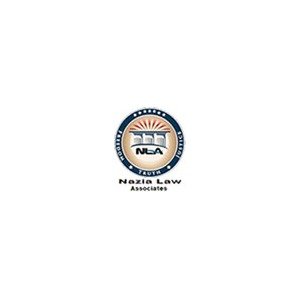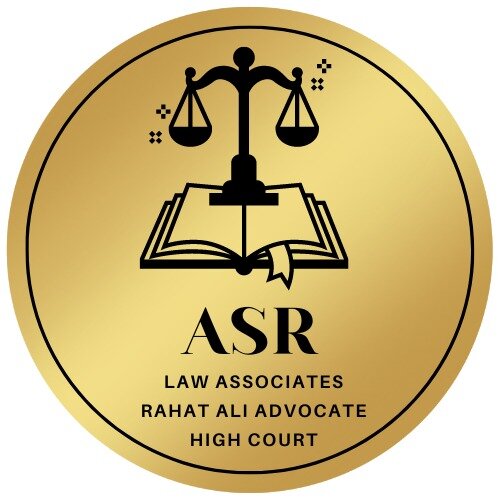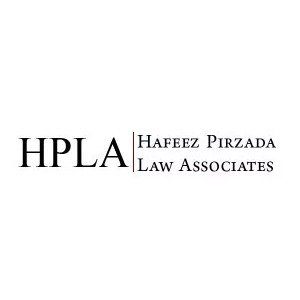Best Land Use & Zoning Lawyers in Pakistan
Share your needs with us, get contacted by law firms.
Free. Takes 2 min.
Free Guide to Hiring a Real Estate Lawyer
Or refine your search by selecting a city:
List of the best lawyers in Pakistan
About Land Use & Zoning Law in Pakistan
Land use and zoning law in Pakistan revolves around the regulation of land development and utilization to ensure orderly growth and sustainable management of resources. It includes dividing the land into zones where specific land uses are allowed or prohibited, ensuring environmental conservation, and planning urban development. These laws are intended to balance the needs for economic development with environmental conservation and community objectives. Governed by local, provincial, and federal regulations, land use and zoning laws aim to manage land-related issues effectively.
Why You May Need a Lawyer
Engaging with land use and zoning laws can be complex due to the intricate regulations and multiple authority levels involved. Legal assistance might be required in various situations, such as:
- If you are planning to buy or sell land and need to understand its permissible use.
- When seeking a zoning change or variance that could impact your property development plans.
- If you face disputes with neighboring property owners over land use rights.
- When challenging decisions made by zoning boards or councils that affect your property.
- If you are dealing with environmental compliance related to land development.
Local Laws Overview
Land use and zoning laws in Pakistan consist of several key components:
- Urban Planning Acts: Govern the methods for land allocation for residential, commercial, industrial, and agricultural purposes.
- Environmental Protection Laws: Ensure that land use complies with national standards for environmental conservation.
- Building Codes and Regulations: Control the physical development of land concerning construction and safety standards.
- Provincial Land Revenue Acts: Dictate land ownership, property taxation, and tenancy rights.
- Master Plans: Developed by local authorities to guide the long-term development and zoning policies in urban areas.
Frequently Asked Questions
What is zoning?
Zoning refers to the laws and regulations that determine how land can be used in specific areas. It helps in managing land development and growth.
Who controls zoning decisions in Pakistan?
Zoning decisions are primarily managed by local municipal authorities, planning commissions, and development authorities in collaboration with provincial governments.
Can I change the zoning of my property?
Yes, but it involves a formal petition process to local authorities, which includes public hearings and assessments. Legal assistance is often advisable.
What if my property violates zoning laws?
If your property does not comply with zoning laws, you may face penalties or be required to make changes. Legal counsel can help negotiate or rectify these issues.
How does zoning affect property values?
Zoning can significantly affect property values as it determines permissible uses, which impact the desirability and potential income from the property.
What role does environmental law play in zoning?
Environmental laws help ensure that development projects comply with ecological standards and do not harm the environment, influencing zoning decisions.
Can a zoning decision be appealed?
Yes, zoning decisions can be appealed. This typically involves a legal challenge, which a lawyer can help navigate.
Is there a difference between land use and zoning?
Land use refers to the manner in which land is utilized, whereas zoning is the regulatory framework that governs types of permissible land use.
What is a master plan?
A master plan is a comprehensive framework developed by municipal authorities, detailing land use policies and strategies for regional growth and development.
Who enforces zoning laws?
Local municipal bodies and development authorities typically enforce zoning laws, ensuring adherence through inspections and compliance checks.
Additional Resources
For further information, consider exploring the following resources:
- Local Municipal Development Authorities
- Provincial Revenue Departments
- National Environmental Protection Agency (EPA)
- Urban Unit (Punjab) for comprehensive planning and zoning data
- Pakistan Environmental Protection Act 1997
Next Steps
If you require legal assistance in the field of land use and zoning, consider the following steps:
- Research and identify experienced land use attorneys in your area.
- Gather all relevant documents related to your property and land use intentions.
- Consult with a lawyer to discuss your needs and explore potential legal actions or defenses.
- Stay informed about local zoning laws and changes by participating in community meetings and public consultations.
Engaging with land use and zoning laws in Pakistan requires informed decisions and understanding of local regulations. Seeking professional legal advice can aid in navigating these complex legal landscapes effectively.
Lawzana helps you find the best lawyers and law firms in Pakistan through a curated and pre-screened list of qualified legal professionals. Our platform offers rankings and detailed profiles of attorneys and law firms, allowing you to compare based on practice areas, including Land Use & Zoning, experience, and client feedback.
Each profile includes a description of the firm's areas of practice, client reviews, team members and partners, year of establishment, spoken languages, office locations, contact information, social media presence, and any published articles or resources. Most firms on our platform speak English and are experienced in both local and international legal matters.
Get a quote from top-rated law firms in Pakistan — quickly, securely, and without unnecessary hassle.
Disclaimer:
The information provided on this page is for general informational purposes only and does not constitute legal advice. While we strive to ensure the accuracy and relevance of the content, legal information may change over time, and interpretations of the law can vary. You should always consult with a qualified legal professional for advice specific to your situation.
We disclaim all liability for actions taken or not taken based on the content of this page. If you believe any information is incorrect or outdated, please contact us, and we will review and update it where appropriate.
Browse land use & zoning law firms by city in Pakistan
Refine your search by selecting a city.

















